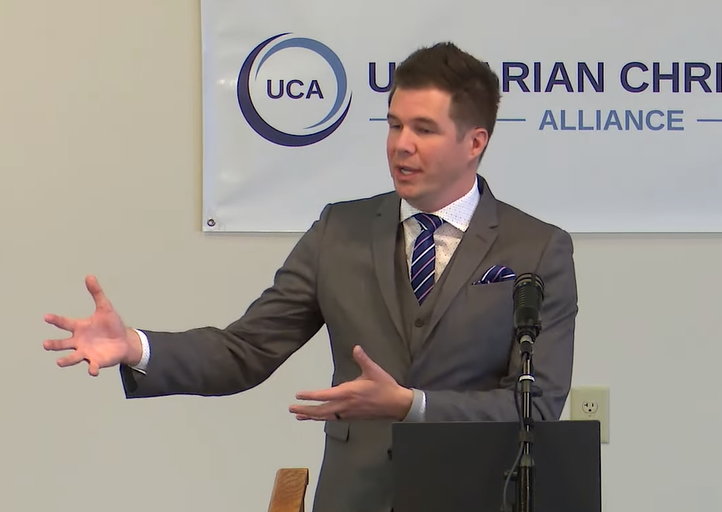Podcast: Play in new window | Download
Subscribe: Spotify | Email | RSS

In the famous creation scene in Genesis God says,
“Let us make man in our image and likeness.”
Genesis 1:26
About such passages trinitarian theologian Dr. Fred Sanders writes,
Outside of the New Testament’s revelation of the Trinity, it’s hard to make sense of the singular/plural dichotomy in these passages. Engaging them with a trinitarian understanding sheds new light on their possible implications.
(source)
Sanders also notes something surprising about the main word we translate as “God” in the Hebrew Bible:
While the word Elohim has the distinct im ending that marks it as plural, Elohim seems to be an agent of singular verb actions. It would be irresponsible to translate Elohim as gods as in “In the beginning the gods created the heavens and the earth.” So it seems that this name of God that is plural in nature could also point to the coming New Testament revelation of the Trinity.
(source)
Is Dr. Sanders correct? Or is there something else going on here?
In this illuminating presentation from the 2022 UCA Conference, Dr. Dustin Smith explains that there is something else going on here: a general linguistic device found in ancient Hebrew and in some other ancient languages. In light of this information, these (to us) unexpected plural forms neither demand nor even hint at multiple persons in God.
If you want to hear more quality presentations like this, meet and fellowship with other unitarian Christians, and take part in practical workshops, please join us at the 2023 Unitarian Christian Alliance Conference in Springfield, Ohio October 19-21, 2023.

Links for this episode:
Dr. Smith’s Biblical Unitarian Podcast
the original UCA video of this lecture
videos from the 2022 UCA Conference
podcast 268 – Another look at Philippians 2 with Dr. Dustin Smith
podcast 119 – The Son of God 3 – Dr. Dustin Smith’s “Socinian” view of Jesus
podcast 62 – Dr. Dustin Smith on the preexistence of Jesus in the gospel of John
podcast 61 – Dr. Dustin Smith on preexistence in ancient Jewish thought
This week’s thinking music is “We are now” by Marco Trovatello.

friend, Jesus is not the 2nd person of a triune god, but He is Almighty God Himself. For that which is begotten of the SPIRIT (father) is that same SPIRIT (son) and not a separate entity John 3.6
father/son is a SPIRITUAL constellation of ONE ALMIGHTY GOD being in heaven and on earth at the same time reconciling the world back to Himself. 2 Sam 7 14…
It is vital that you believe in the LOVE of God His SELF sacrifice, not a selfish sacrifice of a literal father sending his literal son to be sacrificed.
May the Everlasting Father Jesus bless you
Ps you can reach me on YT under “faithful servant serving”
I just listened to this episode 4 times. So educational and informative, but would love to have the paper referenced in the audio. I have checked this episode’s Links, the “Conference Papers” link on the UCA website, and even Dustin Smith’s podcast and can’t find the paper. Does anyone have the link for the paper referenced here? Thanks.
My areas of study have not been in linguistics, so I may be thinking of this too simplistically, but I know enough to say that speaking of the “form” of some words is less instructive than the sense in which those words are being used. We speak of “deer” plural: look at those deer over there. We say the same when pointing to a single deer: look at that deer over there. Is “deer” plural or singular in form? I dunno. If the answer is both, then the answer is neither, but it can be used in a plural or singular sense.
To be sure, no one thinks a deer is really more than one deer just because the same word is used to speak of many deer. Some words make this matter clearer of course because an “s” is added to the end. With other words, the context (and accompanying verbs) matters. The one true God is a single “person”, and this is how the NT portrays him – the God of the Hebrews has a Son (Acts 3:13); does the Trinity have a son?
*My areas of study have not included linguistics…. (obviously 🙂 )
Comments are closed.